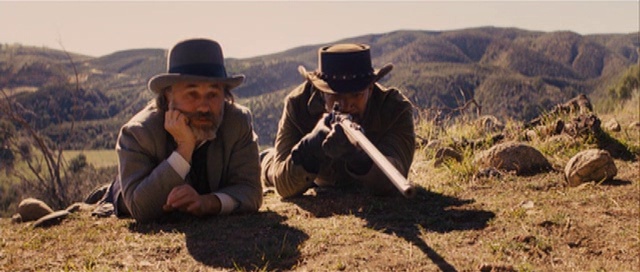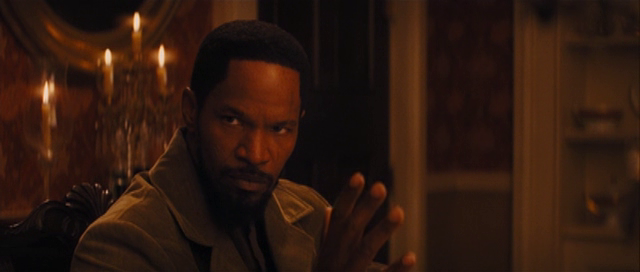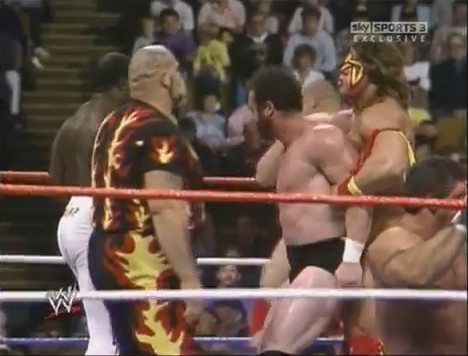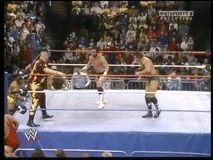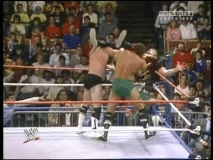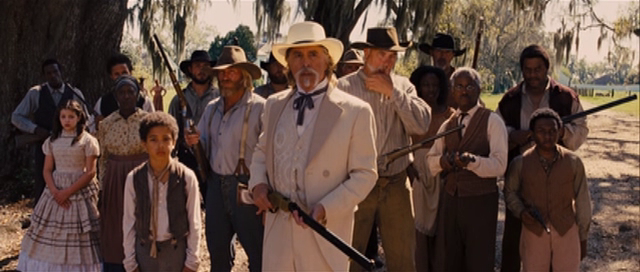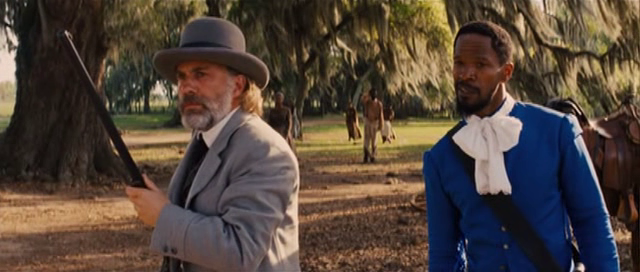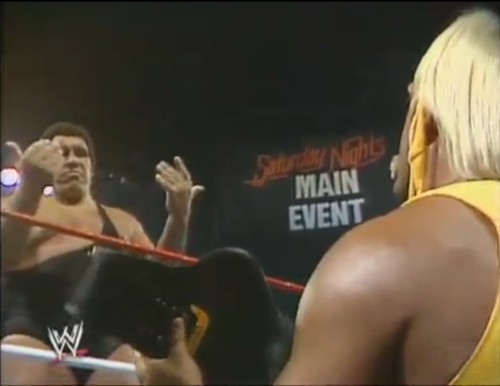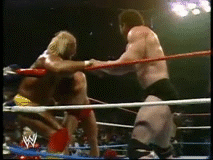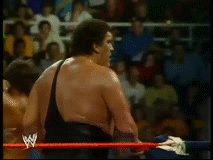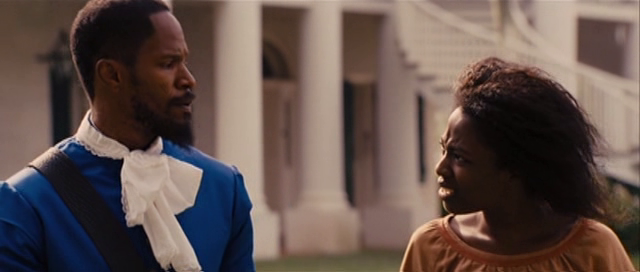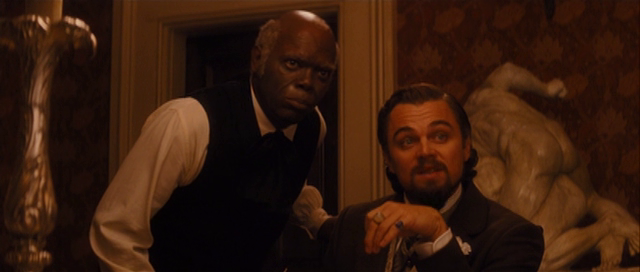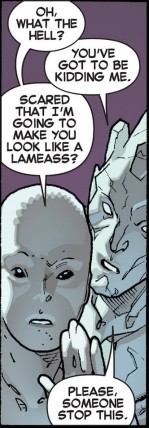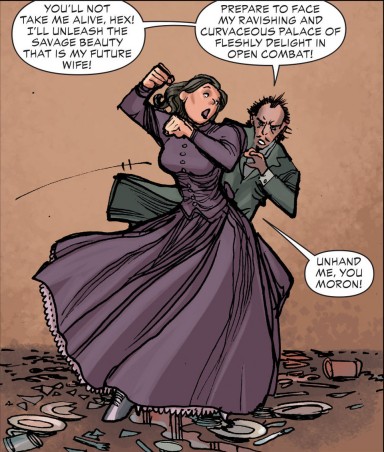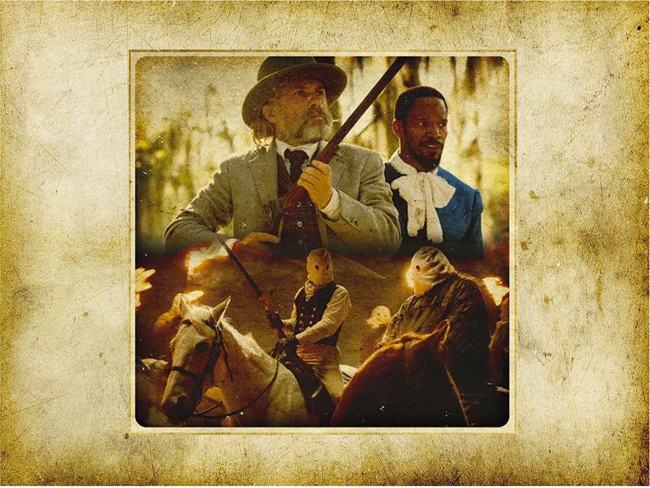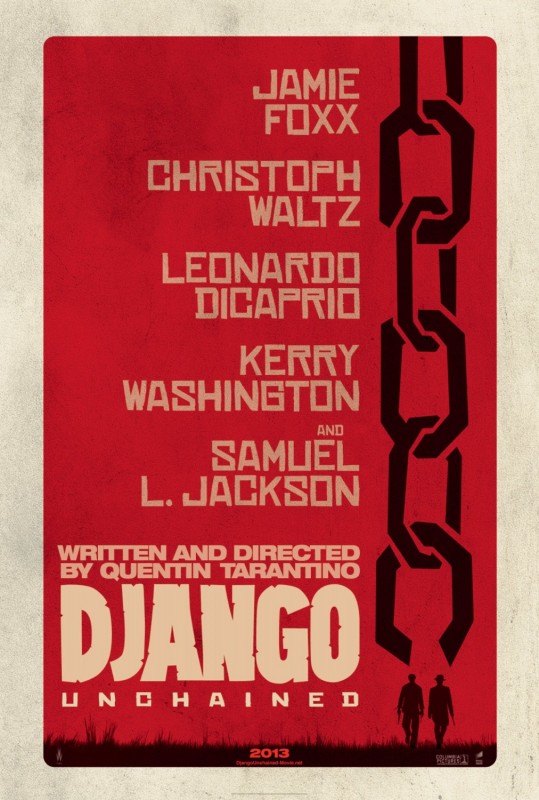
Django Unchained: “I can’t pay no doctor bills (but Whitey’s on the moon).”
January 9th, 2013 Posted by david brothersI gave up on black misery a while back. You know what I’m talking about. Movies or books or whatever about how sad it is to be black, how hard black people got it, and how messed up life is for black people. Whether it’s Precious, The Blind Side, Roots, whatever whatever — I’m through. I’m tired of being reminded of the black condition all the time. I get enough of that in real life, whether through black faces falling victim to the war on drugs or white faces going out of their way to quote whatever cool movie said “nigger” at me at parties. You know BET marathons Roots come Christmastime? I watched Monty Python & The Holy Grail with the fam instead.
It ain’t the sadness or the misery that did me in. I’m fine with either of those, really. But it’s the weight of dozens of movies and history books and conversations that did me in. The highlight reel for blacks in America goes like this: stolen from Africa, fed to sharks, sold at auction, whipped to death and back, freed from bondage and forced into even more bondage, died fighting some machine made of hammers, invented the peanut and stop light, wrote a bunch of poems, decided the front of the bus was the cool spot, got the right to vote, turned into drug dealers and thugs, decided the back of the bus was the cool spot, crackheads&fiends&geeks&junkies, Obama.
It sucks.
Quentin Tarantino’s Django Unchained is what Tarantino calls a “southern,” meaning a western set in the south. It’s the antebellum south, too, and depicts the version of life in the south at that time that you’d expect to see. People say nigger fifty-eleven times, slaves get torn apart by dogs and whipped, and there’s a big fat cotton field.
It’s also the most feel-good movie I’ve seen all year.
The American slave trade was an atrocity. It was government-sponsored genocide. It is a cultural wound, a scar that has never been atoned for and one that we’re still feeling the effects from today.
There are other scars, obviously. But we’ve avenged Pearl Harbor and World War II hundreds of times over the course of an interminable number of video games and movies. We’ve won the west even more often than we’ve won World War II… but we’ve never won slavery.
Just the opposite, in fact. Between moronic Lost Causers and well-meaning creative types, we’ve elevated the Confederate soldier — a man who fought for the right to hold another person as property, regardless of his personal politics — to a frontier hero, a symbol of American exceptionalism. We made scumbags into underdogs.
Django Unchained is a corrective. It’s not the first of its type, but it is by far the highest profile. Instead of wallowing in misery, Tarantino gives us — me — the story we’ve been waiting for: a violent, bloody revenge tale set in a time period that we have been continually dishonest about.
Why’d it take so long? I figure it’s because you can otherize the perpetrators of those other wounds. Nazis are German, the west was won over the bodies of Mexicans and natives… you can point at them and say “That’s them, not us.” You can’t do that with slavery. I mean, you can — you should — but what you’re really doing is “That’s Jody’s great-grandfather. That’s Ella Mae’s great great grandma. Nathan still spends summers between school in that house.”
It’s too close. You have to accept the fact that the people whose lives led directly to your life profited off misery. It takes the fun out of the revenge, when you realize that you’ve benefitted from the actions of the people doing the oppressing. (We all have, though. This ain’t a black or white thing.) It’s easy to feel distance and enjoy that righteous anger when our lone hero is shooting up the bad guys when they’re from some country you can’t even spell or have never visited. When it’s your people, though…
I loved it, though. I’ve been waiting for this movie for years. We treat slavery and the Holocaust and 9/11 with kid gloves a lot of the time. We act like the only proper response to misery is more po-faced misery. That’s no way to get past something, though. That’s no way to grieve. We need to be able to laugh and cheer and appreciate the fact that, despite the horror, we were here. We lived our lives, we did the best we could, and sometimes, we did something extraordinary.
I’ll probably never get my Nat Turner action movie, but Django Unchained is a nice stopgap. I needed this. A lot of things that fall under the umbrella of “the black condition” make me mad, and there’s nothing I can do it about it. I’m one dude up against the weight of centuries of oppression and billion dollar industries. I type on the internet and donate out of my meager paycheck when I can.
So yeah, I’m going to sit in a theater in smalltown Georgia, late at night with a theater full of black people and watch this movie. And we’re going to cheer and hoop and holler and revel in the fact that it’s 2012 in the United States of America and we’ve finally got the ultimate black fantasy on the silver screen, with a fat budget, great direction, and an amazing cast. And all it took was a white dude who’s really into black culture to write and direct it, which I feel like makes it the most American story of all.
John Wayne has a lot to answer for, but you can’t deny how powerful and invigorating a lone man righting wrongs can feel sometimes.

